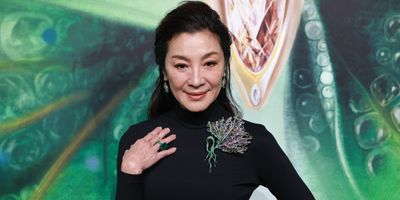January 12, 2024
It is daunting, and not a little disheartening, to read about the achievements of truly successful people. The three recipients of the WEF’s Crystal Awards are cases in point. The Crystals are awarded at the opening session of the annual summit to celebrate the achievements of artists deemed to have built bridges and acted as role models for others. Last year’s winners were American soprano, Renée Fleming, and British actor, Idris Elba, while past recipients have included Matt Damon, Margaret Atwood, Sidney Poitier, Yo-Yo Ma, and Bono.
The resumés of this year’s crop make for an exhausting read. Malaysian actress Michelle Yeoh won an Oscar last year for her portrayal of struggling laundromat owner, Evelyn Wang, in “Everything Everywhere All at Once.” Her lengthy CV also includes “Crouching Tiger, Hidden Dragon,” the Bond movie “Tomorrow Never Dies” and “Star Trek: Discovery.” But it is her good works outside of the movie industry that are equally impressive: Disaster relief, HIV/AIDS poverty reduction, animal conservation, gender equality, and road safety are all causes to which she has devoted time and energy.
Producer, composer, and musician Nile Rodgers has appeared on albums that have sold 500 million copies – for his own band Chic and as a producer for others, including David Bowie, Duran Duran, Madonna, and Daft Punk. He is honored for his We Are Family non-profit organization, which promotes cultural diversity.
Diébéle Francis Kéré is a Burkinabè-German architect who left his village in Burkina Faso at age 7 to gain an education. He received a scholarship to carpentry apprenticeship in Germany and went on to study architecture. He subsequently set up his own firm that won the Pritzker Architecture Prize, considered to be the Nobel Prize of architecture.
Stories of such excellence may prove inspirational … or they may persuade you to crawl back under the duvet to wonder where it all went wrong.
More For You
Bad Bunny during the Super Bowl LX halftime show press conference at Moscone Center.
Kirby Lee-Imagn Images
100 million: The number of people expected to watch the Super Bowl halftime performance with Bad Bunny, the Puerto Rican superstar and newly minted Album of the Year winner at the Grammys.
Most Popular
Think you know what's going on around the world? Here's your chance to prove it.
- YouTube
An imminent US airstrike on iran is not only possible, it's probable.
Americans are moving less — and renting more. Cooling migration and rising vacancy rates, especially across the Sunbelt, have flattened rent growth and given renters new leverage. For many lower-income households, that relief is beginning to show up in discretionary spending. Explore what's changing in US housing by subscribing to Bank of America Institute.
© 2025 GZERO Media. All Rights Reserved | A Eurasia Group media company.
